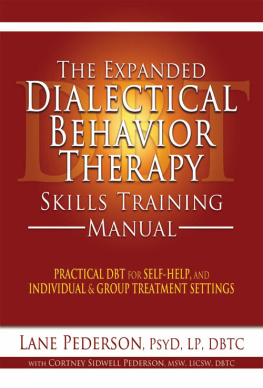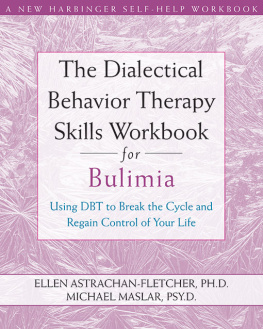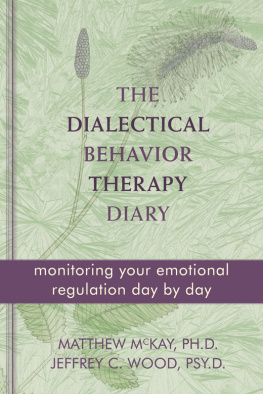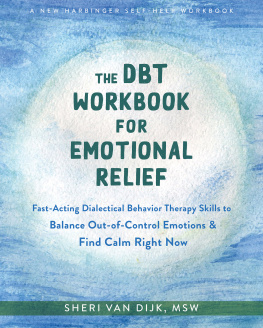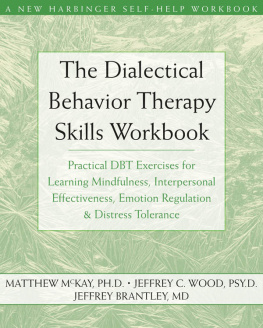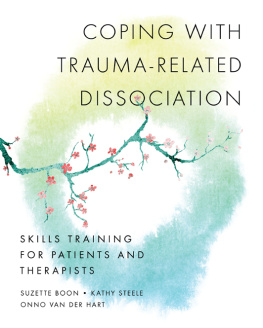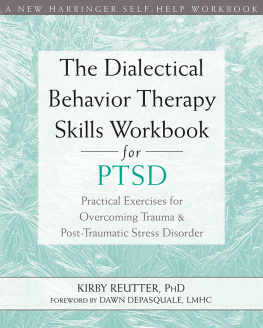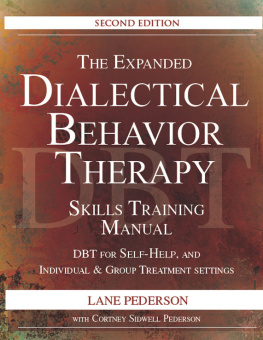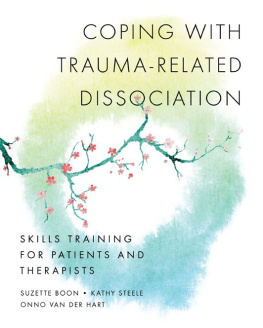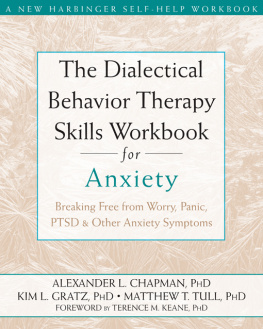Thomas Marra, Ph.D.
There is an urgent need within the mental health field to create practical, coherent and cost-effective treatment models that reflect the complexity of the problems we treat. There is an equally urgent need among our clients to learn skills that actually help them feel better, and that they can continue to develop outside of the therapists office. Lane Pederson and Cortney Sidwell Pederson bring these two streams together in this sophisticated training manual that is at once both simple and intricate. They offer a wide range of specific, teachable skills in the form of worksheets, exercises and activities that make a fine contribution to the growing field of Dialectical Behavior Therapy.
This text is the most comprehensive DBT resource available to date. It will prove useful to both the experienced DBT clinician and therapist new to this model. It can also serve as a resource to clients looking to integrate DBT into their daily lives. This resource has taken the evidence based foundations of DBT and expanded and extended the usefulness of this model through new ideas, suggestions and clinical tools.
This book is jam packed with new and creative information for both facilitators of DBT and those looking for self help that really delivers. The Pedersons bring their extensive experience in helping folks through the roughest spots of life to expand and improve the already effective DBT model.
Barry L. Duncan,
THE EXPANDED DIALECTICAL BEHAVIOR THERAPY SKILLS TRAINING MANUAL
Practical DBT for Self-Help, and Individual and Group Treatment Settings
by
L ANE P EDERSON ,
PSYD, LP, DBTC
with
C ORTNEY S IDWELL P EDERSON,
MSW, LICSW, DBTC
Expanded explanations for the classic modules
Expanded examples and application worksheets
Five new skills modules for therapists and clients
Teaching strategies and skills to overcome barriers
Explanations of clinical policies and program forms
Can be used across settings and diagnoses or as a self-help book
Library of Congress Cataloging-in-Publication information is on file.
Copyright 2012 by Lane Pederson
Published by
Premier Publishing and Media
CMI Education Institute, Inc
3839 White Ave
Eau Claire, WI 54703
Printed in the United States of America
ISBN: 978-1-936128-12-9
All rights reserved. No part of this book may be reproduced or transmitted in any form or by any means, electronic or mechanical, including photo copying, recording, or by any information storage and retrieval system without the written permission from the author (except for the inclusion of brief quotations in a review).

To our children,
Sophie and Sawyer
Contents
About The Authors
Lane Pederson, PsyD, LP, DBTC, is the founder and CEO of Dialectical Behavior Therapy National Certification and Accreditation Association (DBTNCAA), the first active organization to certify DBT providers and accredit DBT programs.
Dr. Pederson co-owns Mental Health Systems, PC (MHS), one of the largest DBT-specialized practices in the Midwest United States with multiple locations. Additionally, MHS is a training center for psychology and social work graduate students and interns as well as post-doctoral fellows. At MHS, Dr. Pederson has developed DBT programs for adolescents and adults, has served as a clinical and training director, and has overseen the care of thousands of clients with comorbid Axis I and II disorders in intensive outpatient settings. Moreover, he has coordinated and directed clinical outcome studies.
Dr. Pederson is a highly-rated and in-demand international speaker and educator in DBT and personality disorders. He has also presented on self-injurious behaviors, treatment-resistant clients, and dissociative identity disorder with a common emphasis on practical approaches to complex client situations. He has a particular interest in evidence-based practices and advocating for what works with clients. He has provided consultation to therapists, teams, case management agencies, and mental health clinics.
Cortney Sidwell Pederson, MSW, LICSW, DBTC, is a DBT therapist who has designed and implemented custom DBT programs. She has worked with adolescents and adults in multiple settings across levels of care. She also participates in the ongoing training and supervision of DBT therapists at MHS.
The authors live in Minnesota with their two children and three dogs.
Preface
Our work with DBT began in 1999 at a nonprofit community mental health center. Back then, DBT was just starting to disseminate into the mental health field as an exciting and promising treatment for clients with borderline personality disorder.
The DBT program developed in that setting had a group format based on a day treatment model and level of care. This program treated some of the highest-risk clients in Minneapolis, Saint Paul, and the surrounding areas and developed a reputation for effective work with difficult client problems.
Our DBT team was active, involved, motivated, and idealistic. We studied and discussed the work of Dr. Marsha Linehan (the developer of DBT) and made it our own, always looking to our clients for information on how to improve the program. We wanted to provide the best possible service, and we cared passionately about the program and clients.
As our DBT program developed, we consulted constantly and pushed each other to be more effective therapists. Our approach embodied the evidence-based practice defined by the American Psychological Association (APA) many years later.
Many of the therapists from this DBT day treatment program went on to develop successful DBT programs in other clinics or in their own practices over the next decade.
DBT as an approach is now at an interesting crossroads. A brief discussion of standard (Linehan) versus other models of DBT and evidence-based practice is included in this book because of the adherence movement (i.e. the mandate that DBT therapists need to strictly follow the standard model) promoted by Dr. Linehan and her training company Behavioral Tech, LLC.

